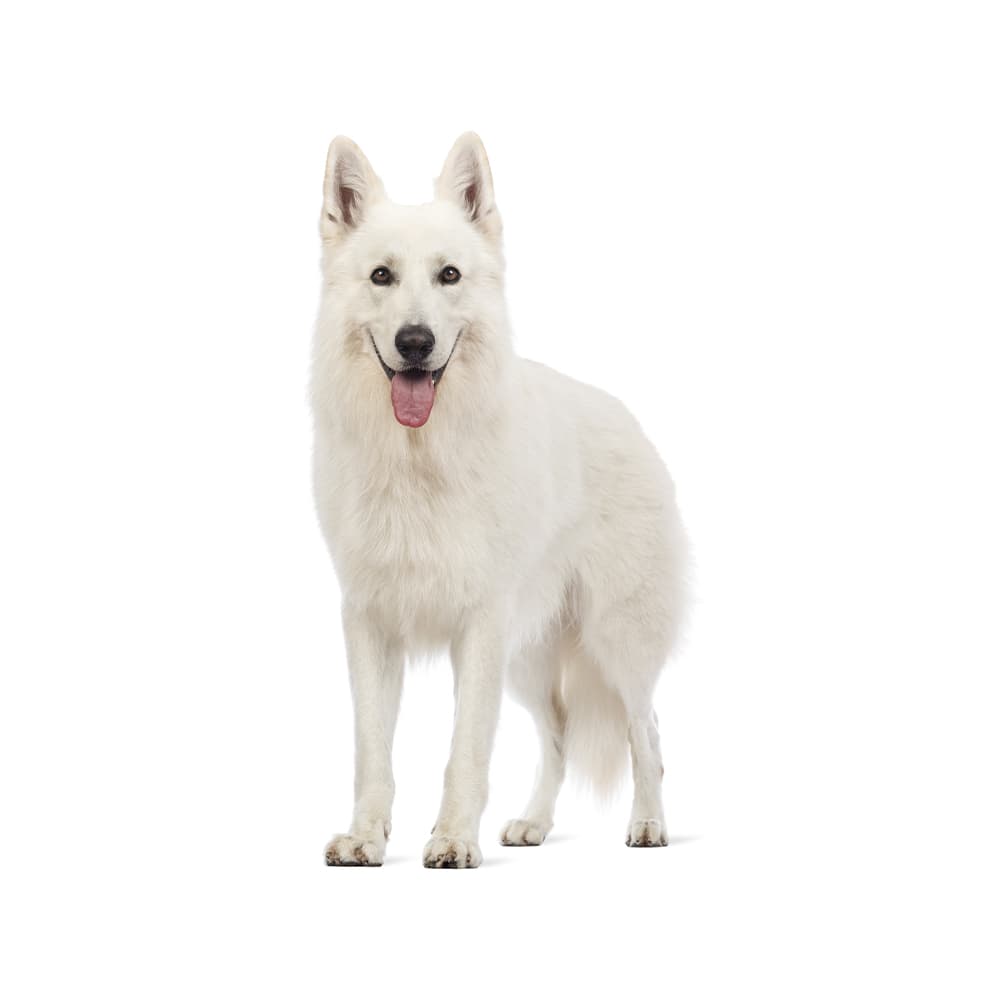Discover your dog's connection to this breed and 200+ others


Discover your dog's connection to this breed and 200+ others



The White Swiss Shepherd Dog, also known as the Berger Blanc Suisse, originates from Switzerland, but its roots can be traced back to the white coat lines of the German Shepherd Dog breed. This breed was first recognized as a separate breed by the Swiss Kennel Club in 1991. The white coat has been present in German Shepherds since their early development, but was officially deemed undesirable in the German Shepherd standard by the 1930s. The color was then excluded from the breed standard and shunned from most breeding programs. However, dedicated breeders in North America and Europe, particularly Switzerland, continued to breed and appreciate these white-coated German Shepherds. White-coated German Shepherds were imported to Switzerland in the 1960s, where they were deliberately bred to create the breed we now know as the White Swiss Shepherd Dog.
White Swiss Shepherds are generally healthy, but can suffer from conditions similar to the German Shepherd breed. These may include hip and elbow dysplasia, epilepsy, hemophilia, diabetes, heart conditions, multiple drug sensitivity, autoimmune thyroiditis, degenerative myelopathy, and degenerative disc disease. White Swiss Shepherds are also susceptible to bloat, also known as gastric dilation volvulus (GDV). This is a life-threatening condition that can come on suddenly, so it’s important to know the warning signs and get an affected dog immediate veterinary care. This breed can be affected by ear infections and eye disorders such as progressive rod-cone degeneration and cataracts.
White Swiss Shepherds are known for their gentle, friendly, and intelligent nature. They are versatile working dogs and have been used for tasks ranging from search and rescue, to guide dogs for the blind, to herding livestock. They are also good family dogs, being patient and protective of their human family members.
They are highly trainable, but like all dogs, they need socialization and training from an early age. They are known to be somewhat more sensitive compared to the German Shepherd breed, so training methods need to be adjusted accordingly.
Despite their close relation to German Shepherds, White Swiss Shepherds are often regarded as having a more relaxed and less intense temperament, which can make them a more suitable choice for families and first-time dog owners.
Their striking white coat is a result of a recessive gene. This means that both parents must carry the gene for a puppy to be white.
They are sometimes mistakenly called "Albino German Shepherds", but this is inaccurate. Their white coat is not due to albinism, but a lack of pigmentation. They have normal-colored eyes and skin.
The breed was recognized by the Fédération Cynologique Internationale (FCI) in 2002 and the UK Kennel Club in 2017.
https://whiteswissshepherd.org/
https://www.thekennelclub.org.uk/search/breeds-a-to-z/breeds/pastoral/white-swiss-shepherd-dog-imp/
https://ofa.org/chic-programs/browse-by-breed/?breed=BBS
https://www.ukcdogs.com/white-shepherd
https://www.fci.be/en/nomenclature/WHITE-SWISS-SHEPHERD-DOG-347.html
Recommended by top vets with decades of experience
21 breeds
64 genetic health markers
50 genetic trait markers
